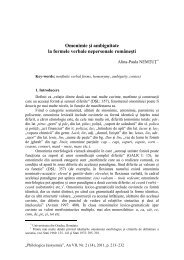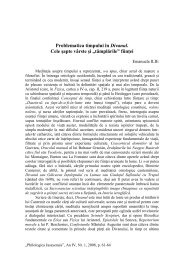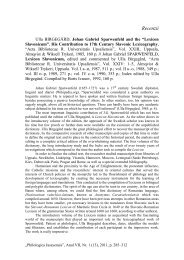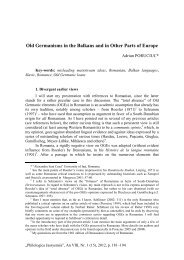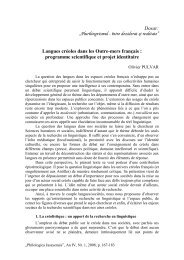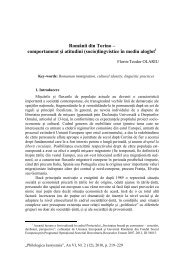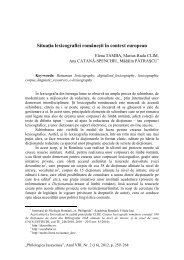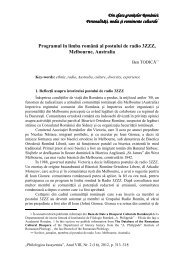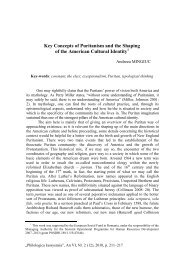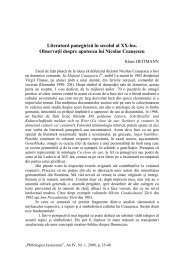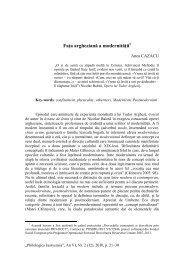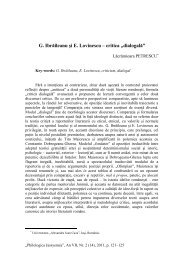Articol despre Stierle - Philologica Jassyensia
Articol despre Stierle - Philologica Jassyensia
Articol despre Stierle - Philologica Jassyensia
You also want an ePaper? Increase the reach of your titles
YUMPU automatically turns print PDFs into web optimized ePapers that Google loves.
A Romanian Literary Topic – The Baragan Plain<br />
shrunk in size. The garden, the horses, Moromete himself, looked as if they had been<br />
dwarfed. The open sky and the fields now seemed to dominate the neighborhood<br />
(Preda 1957: 111).<br />
Fanus Neagu remembers also many times (in Under the Moonshine) about the<br />
dead acacias and describes them as some phantoms.<br />
1. c. The country of the flock of bustards (Odobescu)<br />
The Baragan is at the same time “the country of the flock of bustards”: „In<br />
July the bustards […], like the Danube flamingos, walk their chicks through the<br />
wheat field…”, wrote Fanus Neagu (Neagu 1979: 358). It is a very strange bird,<br />
very difficult to see or to catch – as we learn from other Romanian writer, born in<br />
the Danube Plain, Stefan Banulescu. In his novel entitled Dropia (The Bustard), this<br />
bird is not only a metaphor, but also a reality of this part of the country. This rare<br />
bird is “hard to catch sight of, not only to be grasped. The bustard can’t be caught<br />
either in summer or in autumn, it is difficult to get a glimpse of it, it stands in the<br />
sun at the edge of the stubble. And one can’t look at the sun. It is only on the glazed<br />
frost in winter that one can touch it, when its wings get heavy hindering into fly and<br />
making its walk looks like a hen’s. Even then it’s a hard job”, explains allusively<br />
Victoria to a “stranger”, Miron, who was looking for his former love from his youth.<br />
“Rarely can anyone catch the right moment. Many times, when it is glazed frost,<br />
there is no buster in sight, and when there is one, there is no glazed frost”, she<br />
continued in the same metaphoric and allusive style (Banulescu 1997: 43).<br />
2. The Baragan - the country of the thistles<br />
Paradoxically, the Baragan, “the country of grain”, is also a wild field, “the<br />
country of the violet thistles” that inspired the Romanian-French writer Panait<br />
Istrati 1 in his well-known novel The Thistles of the Baragan. In this book, Istrati<br />
chooses the first sentence of the novel, the incipit of the story a time projection and<br />
space delimitation: “When September dawns, for one month, the vast, wild plains of<br />
Danubian Wallachia settle down to their millenary existence” (Istrati 1930: 9).<br />
Therefore, the fall and “the millenary existence” suggest the repetition that means an<br />
endless time and a boundary space (the vast plain). The second sentences refer again<br />
at “the endless steppe” and gradually the author introduces the place – “Muntenia”<br />
(Wallachia), “the woeful Ialomitza” river and “the grumbling Danube”, the<br />
adjectives being a special projection of the feelings of the inhabitants. The type of<br />
relation between man and the Baragan is stressed also from the very beginning: “It<br />
loves him not.” (…) Like a desert, “the Baragan is solitude itself” (Istrati 1930: 11).<br />
The narrator transfers the human characteristics to the territory: “At first the Baragan<br />
does so passively, like a man who lies down, buries his face in the ground and<br />
refuses either to rise or die. The Baragan is a giant” (Istrati 1930: 10).<br />
1 A. Gide wrote in his Journal, Univers Publishing House, 1970: 551): „It was with great pleasure<br />
that I read Kira Kiralina, the particularly lively story of Panait Istrati’s, a narration of a genuine fragrance<br />
redolent of some stories from Thousand and one nights or maybe of any other picaresque novel”.<br />
11



